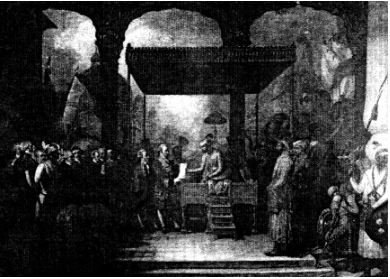Advertisements
Advertisements
प्रश्न
Match the Column:
| Column A | Column B |
| 1. Carnatic Wars | (a) Warren Hastings |
| 2. Farman | (b) duty-free trade |
| 3. Roberts Clive | (c) reconquered Calcutta |
| 4. Battle of Plassey | (d) Siraj-ud-Daulah |
| 5. Battle of Buxar | (e) Anglo-French rivalry |
| 6. Governor of Bengal | (f) Mir Qasim |
उत्तर
| Column A | Column B |
| 1. Carnatic Wars | (e) Anglo-French rivalry |
| 2. Farman | (b) duty-free trade |
| 3. Roberts Clive | (c) reconquered Calcutta |
| 4. Battle of Plassey | (d) Siraj-ud-Daulah |
| 5. Battle of Buxar | (f) Mir Qasim |
| 6. Governor of Bengal | (a) Warren Hastings |
संबंधित प्रश्न
Fill in the blanks:
In 1717, the Mughal emperor granted the United East India Company the right to carry on duty-free trade in __________, ________, and ________.
Fill in the blanks:
In __________ Robert Clive recovered Calcutta which had been captured by Siraj-ud-Daulah in ___________.
Choose the correct answer:
The largest and most prosperous European settlement in Bengal was the British settlement at ___________.
Choose the correct answer:
Alivardi Khan was succeeded by __________.
Choose the correct answer:
The Battle of Plassey was fought in _______.
Answer the following question briefly:
The Battle of Plassey was a major turning point in the history of India. In this context answer the following question:
State the results of the Battle of Plassey.
Answer the following question briefly:
The Battle of Plassey was a major turning point in the history of India. In this context answer the following question:
Why is this battle considered a major turning point in the history of India?
This picture portrays a momentous event in 1765, involving a British Governor and a Mughal emperor wherein the Mughal emperor is conveying the grant of the Diwani to the governor.

What is the importance of this battle?
What plot did Robert Clive hatch to remove Siraj-ud- Daulah?
Match the Contents of Column A Column B.
| Column A | Column B |
| 1. Shuja-ud-daulah | (a) Nawab of Bengal |
| 2. Shah Alam II | (b) Founder of British Empire in India |
| 3. Mir Qasim | (c) 1765 |
| 4. Siraj-ud-daulah | (d) 1765–1772 |
| 5. Battle of Plassey | (e) Calcutta |
| 6. Battle of Buxar | (f) Formed an alliance with the Mughal Emperor and Nawab of Awadh. |
| 7. Grant of Diwani | (g) Mughal Emperor |
| 8. Dual Government | (h) Nawab of Awadh |
| 9. Clive | (i) 1757 |
| 10. Forth William | (j) 1764 |
